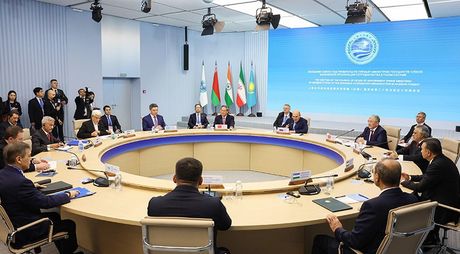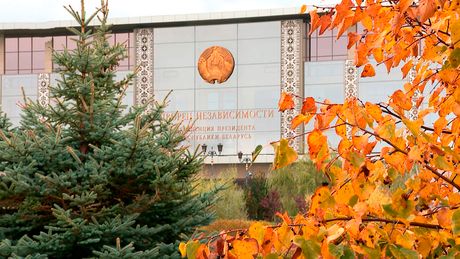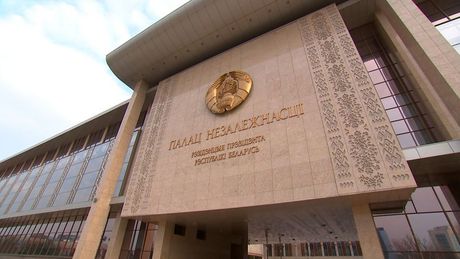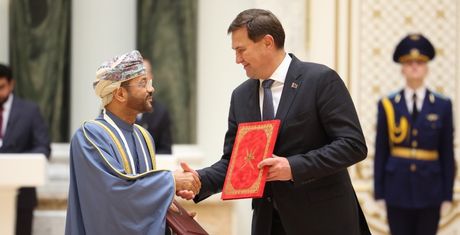Lukashenko identifies goals, priorities of Belarus' presidency over CSTO
12:07, 24 November
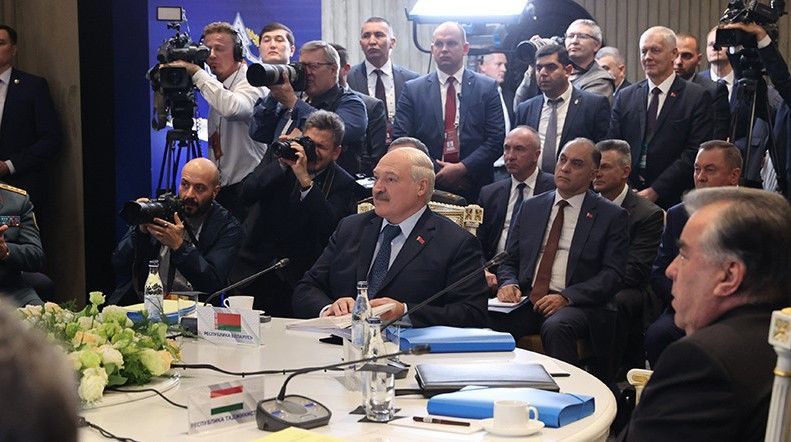
Photo: BelTA
Goals and priorities of Belarus' presidency over the Collective Security Treaty Organization were presented by Belarus President Aleksandr Lukashenko at a plenary session of the CSTO Collective Security Council in Yerevan, Armenia on 23 November, has learned.
- Share on Facebook
- Share on VK
- Share on Twitter
Aleksandr Lukashenko said: “Belarus is taking over the presidency over the Collective Security Treaty Organization in a period of a systemic crisis of international relations. The unprecedented deterioration of the military and political situation on the Eurasian continent is obvious as well as further polarization of approaches to the matter of the new world order.”
The president stated that Western countries persist in attempting to restore a unipolar world order, in enforcing their own rules of the game while norms of international law have been replaced with the diktat of force and the practice of using sanctions to punish “disobedient” countries.
“The unceasing pressure of sanctions against Belarus and Russia is a case in point. The ongoing crisis of the architecture of international and regional security is directly affecting our organization, too. The Collective Security Treaty Organization is being subjected to various challenges and threats of transnational nature and those relating to interstate contradictions,” the head of state stated.
In his words, it is a modern geopolitical reality that the Collective Security Treaty Organization has to exist in and needs to respond to. Both on the domestic front and the foreign front.
GOALS
Aleksandr Lukashenko said: “In emerging conditions we see the following fundamental goals of Belarus' presidency. Domestically we have to improve the unity of the Collective Security Treaty Organization member states. These are fundamental goals: to increase our unity, reduce the level of tensions, and address contradictions between them for the sake of strengthening the organization itself, for the sake of ensuring security and stability in the organization's responsibility area.”
The president remarked that a lot that the CSTO leaders had discussed in private during the summit should certainly remain secret. He said: “But I am an experienced man already. Not a young politician anymore. It was the first time we'd had such an honest and sincere conversation. We came to terms on 15 points. It was the first time we'd agreed (there was concrete movement in this direction) that there are contact points, which are necessary for coming to terms. All of us understood from words of the current chairman [Armenia Prime Minister Nikol Pashinyan] that this Armenia-Azerbaijan conflict will end and a peace treaty will be signed if we act as we've discussed it today.”
The president said he had received the news with enthusiasm. “Since Nikol Vovayevich [Pashinyan] is silent, it means he also agrees with what I've just said. You can see he is in agreement,” Aleksandr Lukashenko remarked.
Yet Aleksandr Lukashenko stated that there are also other conflicts that need to be resolved in the Collective Security Treaty Organization region. The situation at the Kyrgyzstan-Tajikistan border was mentioned. “As [Tajikistan President] Emomali Sharipovich [Rahmon] said today there is very serious movement forward together with the Kyrgyzstan president. We have to remove these conflicts if we want to be a genuine and responsible organization. If we cannot resolve these issues among ourselves and move forward, then I agree with you: what are we capable of then? This is why there are very serious steps forward in this direction,” the Belarusian leader stated.
Speaking about international affairs, Aleksandr Lukashenko mentioned Belarus is intent on enhancing the role and the significance of the Collective Security Treaty Organization in the system of international relations. “And on the comprehensive accordance of the organization's work with the context of regional and global security,” he added. “Let me explain: countries don't really want to deal with us, particularly our main competitors, so to say, NATO countries. They keep their distance from us whatever we may offer to individual NATO member states, to the collective West. But very serious shifts have been secured within the framework of the Shanghai Cooperation Organization, the Commonwealth of Independent States. Heads of European countries already notice us. They may call us some ‘paper tigers' at first but since they've noticed us, it means we exist. And we will have to move in this direction.”
The head of state noted that Belarus' presidency is expected to proceed under the slogan “Through solidary and cooperation towards peace and security”. Several priority areas have been identified.
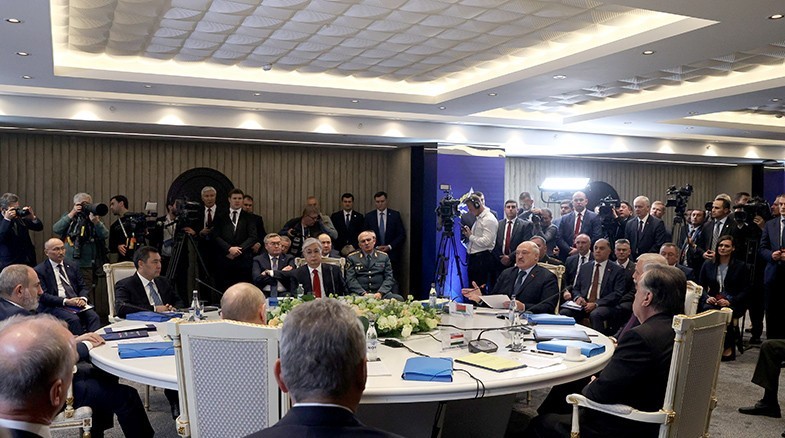
PRIORITIES
Resolution of crisis situations
“The resolution of crisis situations and the prevention of further destabilization in the CSTO's responsibility area should remain in the center of our attention,” Aleksandr Lukashenko is convinced.
According to the president, January events in Kazakhstan, the conflict in Ukraine, the situation at the Armenia-Azerbaijan border, and the situation at the Kyrgyzstan-Tajikistan border vividly confirm the vital importance of this idea. “All of us need peace! And as all of us stated absolutely unanimously, nobody needs war!” the Belarusian leader stated.
Aleksandr Lukashenko assured that Belarus' presidency would undertake all the possible diplomatic efforts to deescalate tensions, reduce the conflict potential, and raise the level of mutual trust through joint actions of the CSTO members. “It will allow securing the leading role of the organization in matters concerning the enabling and enhancement of regional security in our responsibility area. Our joint efforts should have a positive impact on the situation in the CSTO's responsibility area, including in Eastern Europe,” he said.
In order to effectively respond to a broad range of crisis situations emerging in the CSTO's responsibility area, Belarus intends to focus efforts on improving the organization's legal base and national legislations. Belarus believes it should enable prompt authorizations for the deployment of collective security forces and assets. There are plans to pay attention to a simplified procedure for the transit of contingents with weapons and military hardware across territories of the member states. “We've already had the relevant experience due to some events. We spent days coordinating the movement of our forces over there and back. It is not normal. It is not normal if we need days to reconcile things when escalation is in progress and borders on a military conflict. This is why we have to act faster in this regard. Success of any military or peacemaking operation depends on rapid movement of troops,” the president noted.
According to the head of state, the anticrisis mechanisms that do not need forces and assets of the CSTO collective security system need to be developed further. The effectiveness of their application needs to improve. “Mechanisms without military force. We have yet to finalize work on the matter of using flexible ‘political' tools or so-called soft power, if you want. The kind of soft power that Western countries actively use such as consultations, monitoring, and observation at the local level,” he pointed out.
In order to improve cohesion and step up interagency interaction in counteracting transnational challenges and threats to security, Belarus intends to organize events concerning responsibility areas of the relevant agencies. Representatives of other interested countries and specialized international organizations may be invited to attend. “There is no need to rush, to run to NATO right away and the rest. We have to bring them here in order to attend our events little by little: if they want it, they will come, if they don't, that's okay, too,” he added.
Aleksandr Lukashenko said: “We have to tackle fake news, disinformation. We have to jointly respond to cyber incidents, protect territories of the CSTO countries from drugs smuggling. We have to take care of international cooperation in the area of protection of critical infrastructure, including nuclear facilities. In the context of the growing relevance of biological security problems we suggest organizing a session of the relevant coordinating council of authorized bodies of the organization's member states in Belarus.”
The president went on saying: “I am talking about biological security and about the organization of an appropriate event in Belarus but we have to honestly say something to each other after all. Vladimir Vladimirovich [Putin], we often talk about biological labs. I think only Belarus and Russia don't have them but they exist in some CSTO countries. This is why it is necessary to discuss it in Minsk and come to an agreement on the matter somehow because it will be yet another talkfest.”
“Biological security is no joke. We try to persuade each other while American labs or labs of other countries exist in some countries. Just like several labs have been found in Ukraine,” the president added.
Effective positioning of the CSTO
Aleksandr Lukashenko said: “Effective positioning of the Collective Security Treaty Organization in the system of international relations by advancing cooperation with international organizations and third countries represents a key factor for our organization's inclusion in the most pressing problems on the international agenda. The organization has to be at the forefront of international life and live up to the constantly changing challenges of regional and global security.”
Belarus suggests arranging a broad discussion of the international agenda from the point of view of CSTO interests on the sidelines of an international high-level conference on Eurasian security. Top officials of the secretariats of the United Nations Organization, the Shanghai Cooperation Organization, the Commonwealth of Independent States, and other international organizations will be invited to attend the conference. The conference is supposed to take place in Minsk in 2023.
“The conference is supposed to stress the role and place of the Collective Security Treaty Organization in regional and global security, the peace-loving factor of our association, its orientation towards enabling the necessary military and political conditions for successful achievement of sustainable development goals. The event will also enhance support of positions of likeminded countries in the fight against the policy of unilateral coercive sanctions at the international level,” the head of state stressed.
Aleksandr Lukashenko also remarked that the expansion of partnership ties with global players such as China would contribute to the enhancement of the Collective Security Treaty Organization's standing in the international scene. “With this in mind Belarus' presidency intends to initiate a strategic dialogue between the Collective Security Treaty Organization and the People's Republic of China (we may think about India, too) by means of organizing meetings in Belarus of representatives of the ministries of foreign affairs, defense, offices of the security councils of the CSTO member states and the corresponding countries like China, for example,” the president said.
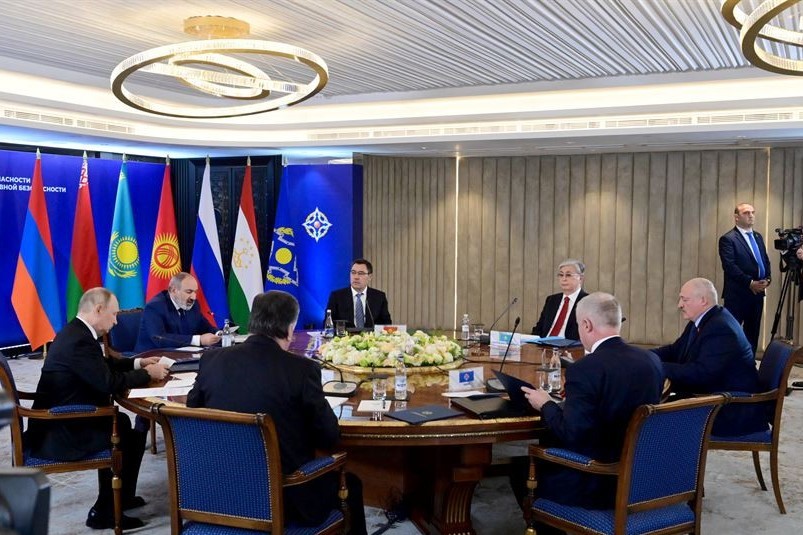
The enhancement of the CSTO's military component
Aleksandr Lukashenko said: “The military component of the Collective Security Treaty Organization is an inalienable component of the organization. The organization was essentially built around it 20 years ago. As for priority tasks in this field, we believe it is necessary to increase the readiness of components of the CSTO forces to carry out their missions and to step up military technology cooperation of the member states.”
Aleksandr Lukashenko remarked that the successful accomplishment of missions by the CSTO forces depends on their thorough training and equipment with modern weapons and special gear. “You know I am ashamed to talk about it. This problem has to be resolved once and for all within one year. We have to pool resources – it doesn't cost much – and arm our guys, whom we use for peacekeeping missions and other ones. And we have to demonstrate that we can kit out our guys as well as NATO countries can,” he stressed.
With this in mind a number of joint exercises involving command and control bodies and forces and assets of the CSTO collective security system will be planned and carried out in Belarus' territory in 2023.
According to Aleksandr Lukashenko, the development of the coalitional military technical component depends heavily on the organization's member states pursuing a coordinated military technology policy.
“Belarus and Russia have accumulated serious experience (a blessing in disguise) of intensifying military technology cooperation and creating ordinary and cutting-edge weapon systems. Feel free to join us, you are no strangers,” the president suggested.
Belarus' presidency over the Collective Security Treaty Organization intends to pay close attention to stepping up efforts to work out common approaches in the area of standardization and inventorying of defense products and the promotion of manufacturing cooperation for making defense products. “Just what we are doing within the framework of manufacturing cooperation with Russia. All of it should ensure the joint development and production of modern weapons and military hardware in the future,” Aleksandr Lukashenko assured.
In his words, the conflict in Ukraine demonstrates that old weapon systems should not be forgotten. “Grad, Smerch, Uragan, and other [multiple-launch rocket systems] are still quite good,” Aleksandr Lukashenko said.
Enhancement of the analytical component, response to information wars, and mass media positioning
Aleksandr Lukashenko reminded that at a meeting of the CSTO leaders in Moscow on 16 May he spoke about the importance of analysis and projections in the organization's work. “This is why we are going to focus on building up the institutional potential of the Collective Security Treaty Organization in the sphere of information and analysis. We see it as a guarantee of quality enhancement of the organization and more effective response to emerging challenges and threats to security,” he said.
The president drew attention to the information and psychological operations that the West and primarily NATO focus heavily on in the course of the information war in Ukraine's territory. “We see it very well and take care of it. I think the Russian Federation does, too. We need to know how to do it in order to respond to their attacks. Because there are so many fakes over there starting with Bucha events and ending with recent events,” he said.
“Information and psychological operations are akin to military operations. We have to be ready for them,” Aleksandr Lukashenko stressed.
According to the president, the formation of a network of national analytical institutes for strategic studies in the member states will be a concrete practical contribution to the accomplishment of this task. “It will allow uniting the scientific and expert potential of our countries in the name of ensuring peace and security. We see it as an important tool for preparing conceptual and strategic documents on topical matters of international and regional security in our organization,” he noted.
Belarus suggests arranging a meeting of heads of national analytical institutes for strategic studies of the CSTO member states in Minsk in 2023 for the sake of organizing systemic work in this field. “We've already held several events of the kind together with Russia. By the way, upon Russia's initiative. And the expert community took it very well,” the president noted.
In his words, media positioning of the Collective Security Treaty Organization, including presence in foreign mass media, is an important component, too. “We believe that it is now necessary to not only step up information work but work out new approaches. I think Russia with its powerful mass media system should play the main role in it. Russia certainly has bigger capabilities,” the Belarusian leader noted.
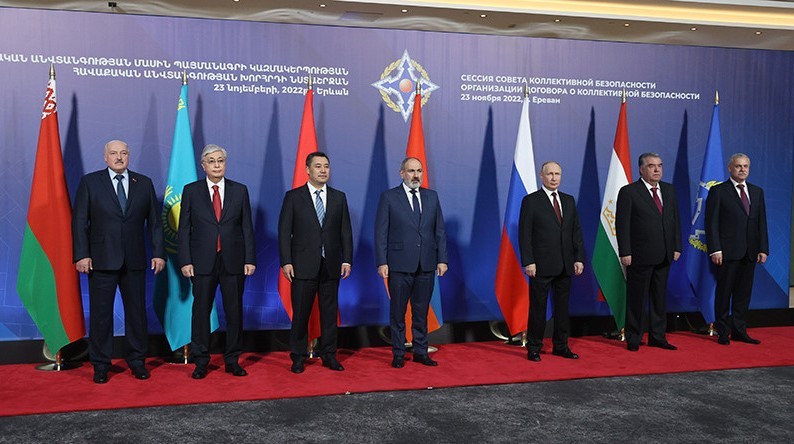
The CSTO's future and mutual support
Summing up what he had said, Aleksandr Lukashenko noted he had presented only the main aspects of Belarus' vision of joint work in the course of the country's presidency over the Collective Security Treaty Organization. He said: “I presented matters depending on whether we can work and agree on them. Because we make all the decisions by consensus after all. This is why I could have presented an extensive program here. But whether we will be able to reconcile these concepts bearing in mind our own national interests is the question. Naturally some things will be adjusted taking into account the changing situation both inside and outside the organization. Some of the things I've mentioned are new. Some of them are the things we'd managed to forget well. At the same time we have to move on for the sake of prosperity and security of our nations.”
“There is no doubt that the realization of the mentioned proposals is possible only if all the CSTO member states back them up. I'll say it straight: we count on it,” Aleksandr Lukashenko stressed.
The head of state remarked that mass media have been recently speculating that the life and the fate of the Collective Security Treaty Organization depend on the outcome of Russia's special military operation in Ukraine. “If Russia wins, then the CSTO will live. If, god forbid, it doesn't win, then the CSTO will not survive either. And many hotheads in our countries have also started discussing this problem,” he stated.
“I feel that we now share the opinion that if, god forbid, Russia falls, then our place is under these broken pieces,” the Belarusian head of state said.
“This is why we should not only defend but understand each other (as we always used to say in normal times): ‘Russia this, Russia that, the key role of Russia…' So, such talks have to stop. We are not going to leave the military and political arena. The Collective Security Treaty Organization will continue to exist and nobody anywhere is going to fall. But we need unity,” the Belarus president added.
Aleksandr Lukashenko also assured that on its part Belarus will exercise maximum effort in order to make sure that the country's initiatives and proposals would contribute to further development of the organization, to better effectiveness of all the mechanisms of the organization, and would benefit the member states.



